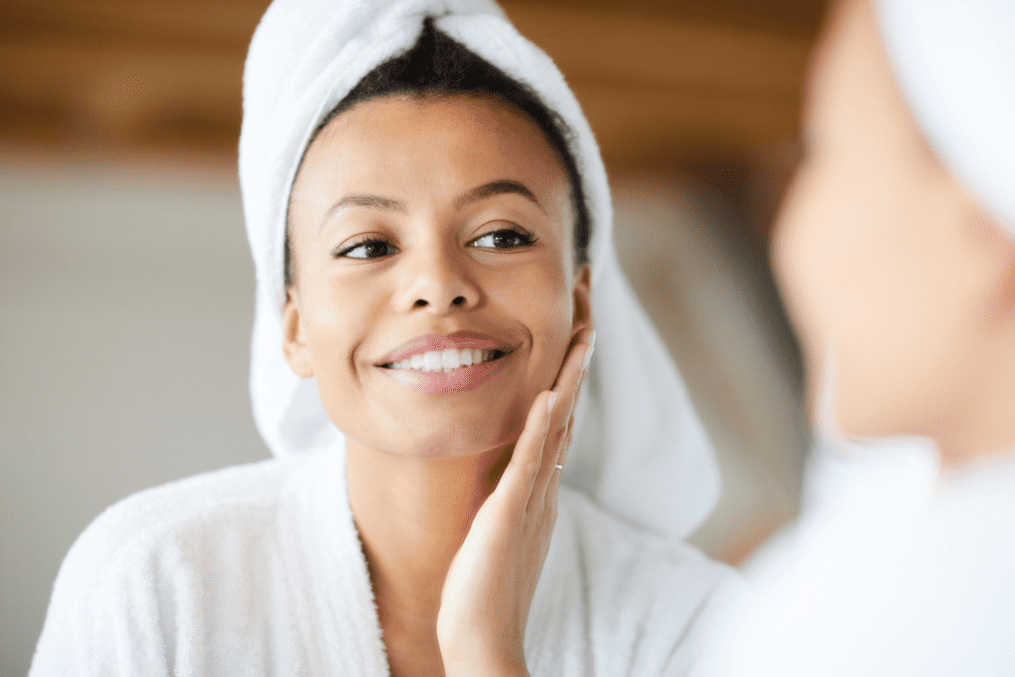The positive power of beauty rituals

We’ve all been there: you wake up yawning, bleary-eyed, and really not feeling it. So you wash your face, add a quick coat of mascara, and, bang, you suddenly feel that you can face the day. This may just sound like your regular Monday morning, but a number of women are turning to the positive power of beauty rituals to ease far greater struggles in their life.
In line with the trend for embracing self-care, we’re increasingly understanding that beauty routines can act as a powerful tool against mental health issues like depression or anxiety. Even if it’s just a few minutes applying moisturiser, sufferers are actively taking the time to look after themselves, something they may not have thought to do otherwise.
It’s personal
While studies (other than those carried out by beauty brands) are hard to find, there is some research into the power of make-up, with one finding those who choose to wear it do so because it helps them feel confident and strong. Other studies found a link between cosmetics and the outward appearance of self-confidence, and the creative aspect of make-up has been proven to be a natural mood-booster. Plus, there’s a plethora of books, blogs and lengthy online forums detailing similar experiences with wider mental health. We’d argue that the only test of any importance is the individual’s; if a mask, a quick massage with facial oil or a slick of lipstick makes you feel good, surely that’s all that matters.
Under the skin
But that’s not to say there’s no expert backing. The rise of self-care already comes industry approved, and Dr Amy Wechsler, a New York-based dermatologist and psychiatrist, fully believes in the soothing power of beauty. One of a handful of physicians who can comment on both skincare and mental health, she takes a two-pronged approach to treatment. ‘The mind and the skin are inextricably linked,’ she says. ‘There are multiple interconnections that go in both directions, with the mind affecting the skin, and vice versa, both positively and negatively.’ This might sound far-fetched, but it’s clear our emotions can show on our skin – think of the last time you blushed from embarrassment, for example. ‘In fact, embryonically, the brain and the skin are formed from the same layer of cells,’ explains Dr Wechsler. ‘Because of that, there are many nervous system connections.’
Reclaiming control
Neglecting to take care of oneself is a common phenomenon among those suffering from mental health issues. ‘Their routines can go out the window,’ says Dr Wechsler. ‘Something as simple as a three-minute skincare routine twice a day can be huge. It’s great for helping lower stress and anxiety, and it keeps your skin healthy, which feeds back positively. In the throes of negative mental health, everything can fall apart. But if someone starts with continuing their skincare routine, it helps them regain control in other areas.’
After the birth of her daughter, entrepreneur Jo Love suffered with postnatal depression. Her baby gifting website, Lobella Loves, donates a percentage of each sale to help mothers with mental health issues. ‘I felt so alone when I had postnatal depression,’ says Love. ‘I felt like a failure and no one seemed to be acknowledging how hard motherhood actually is. For me, there is an incredibly strong connection between a good beauty routine and my mental health. Those 15 minutes in the morning when I put on my make-up is my “me” time before taking on the day. And my nightly skincare routine and Sunday face mask are essential mini-moments of much-needed self-care.’
A matter of time
Indeed, the effectiveness of beauty rituals is as much down to the time they take as the act itself. ‘When we’re taking care of our skin we can’t be on our phones, we can’t be on our computer; it’s just a little break,’ says Dr Wechsler. ‘In Asia, women tend to take many more steps than we do in the Western World and I don’t think the thirteenth product you put on your skin actually does anything, but the act of massaging in each product, and taking all that time, can only be helpful.’
Not at face value
While losing a sense of self-presentation is true for many sufferers, mental health can look any number of ways, as Love knows only too well. She documented her struggles online, sparking the #DepressionWearsLippy campaign. ‘It started after an Instagram troll told me I couldn’t possibly have a mental health condition because I looked too groomed,’ she says. ‘This spurred me on to challenge what the “face” of someone with a mental health condition looks like. Mental health doesn’t discriminate and neither should we; you can be rich, poor, young or old, have lippy on and wear nice clothes and still be suffering. What we see on the outside is not always a true reflection of what is happening inside our heads.’
It’s a strategy that many will be familiar with: sometimes make-up can act as a mask, and that’s fine. ‘I often find myself bristling whenever I hear messages that deride the use of make-up, because it has been one of the most accessible and harmless coping mechanisms of my life,’ says Love. ‘Make-up doesn’t cure my depression – but having a slick of lipstick or wearing a coat of mascara has helped me face the world when, without it, I haven’t wanted to.’






